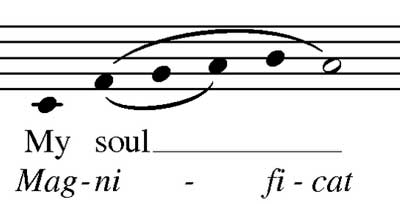
When they met, the baby in Elizabeth’s womb jumped for joy, and Elizabeth herself proclaimed Mary as “most blessed” among women (1:39-45). Mary was so moved by all that was happening around her that this beautiful prayer practically tumbled out of her—a prayer of praise and gratitude for the God who was doing such marvelous things.
At the beginning of her song, Mary expresses her love for God by saying, “My soul proclaims the greatness of the Lord” (Luke 1:46). Then she goes on to express a key spiritual principle that Scripture illustrates over and over again:
God chooses the lowly and the humble over the proud, even though the proud are often more educated and more qualified. Mary saw that God reaches out to the needy. She understood that God sends his strength to those who know that they are weak, and his grace to those who know they cannot survive without it. By contrast, he leaves those who do not see any need for him empty and barren (1:52-53).
Just as Elizabeth announced Mary as blessed among women, the angel Gabriel greeted her as the “favored one,” acknowledging that the Lord was with her in a special way (Luke 1:28). Just as the rain falls from the sky and fills our rivers and streams, so the grace of God flowed from heaven and filled Mary completely. Divine grace perfected her, and that is why she was able to become God’s handmaid—and even his mother— to such a complete extent.
Mary’s Magnificat disposition allowed God to do in her the very thing he wants to do in us—transform her into his likeness. What Mary did not understand when Gabriel first met her, she eventually found out (Luke 1:34). What she did not know when her young son told her “Did you not know that I must be in my father’s house?” (2:49), she eventually came to understand. Whenever Jesus did something that was new and unexpected, Mary’s first thought was always to take careful note and ponder it prayerfully.
A Song from the Heart. So what does Mary’s Magnificat teach us? It shows us that Mary wanted to honor God with her whole being; it shows us that she was mindful of the great things God had already done for his people; and it shows that she was willing to do whatever God asked of her.
Just like Mary, each of us has our own song that we sing to the Lord. This song is our response to whatever work of grace he is accomplishing in us. In Mary’s case, her song became her very philosophy of life. It was her song that guided her, not the various circumstances she faced—not even the possibility of divorce, Herod’s murderous wrath, or of the agony of watching her son endure a torturous death.
This is not to say that Mary was unaffected by what happened around her. It did mean that she wanted the decisions she made in these circumstances to be influenced by the Spirit’s leading. Similarly, our song to the Lord will be as rich as Mary’s as we learn to tell Jesus: “I need your grace because I want to do your will in everything—in the joyful times of life, in the challenging times, and in the painful times as well.”